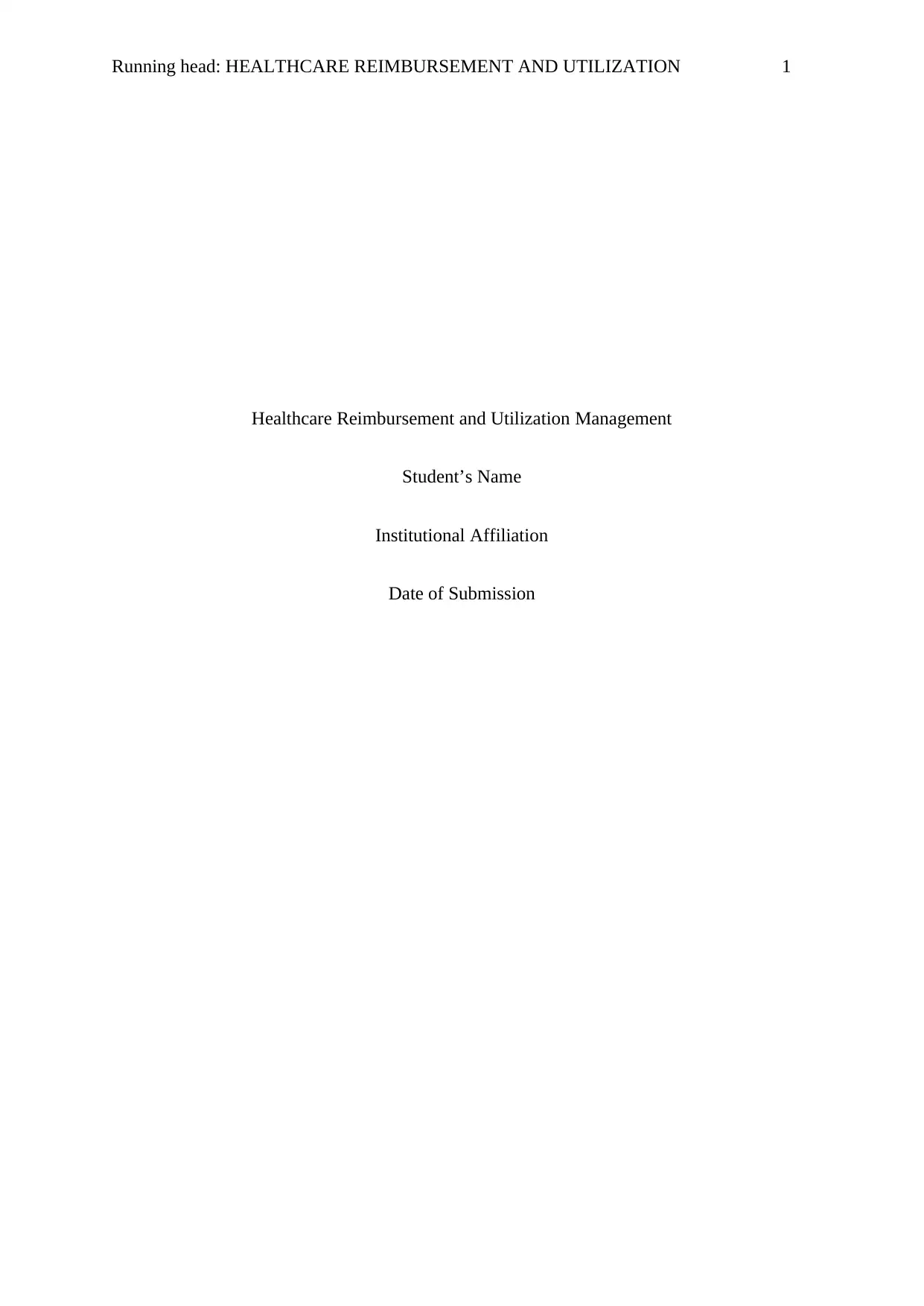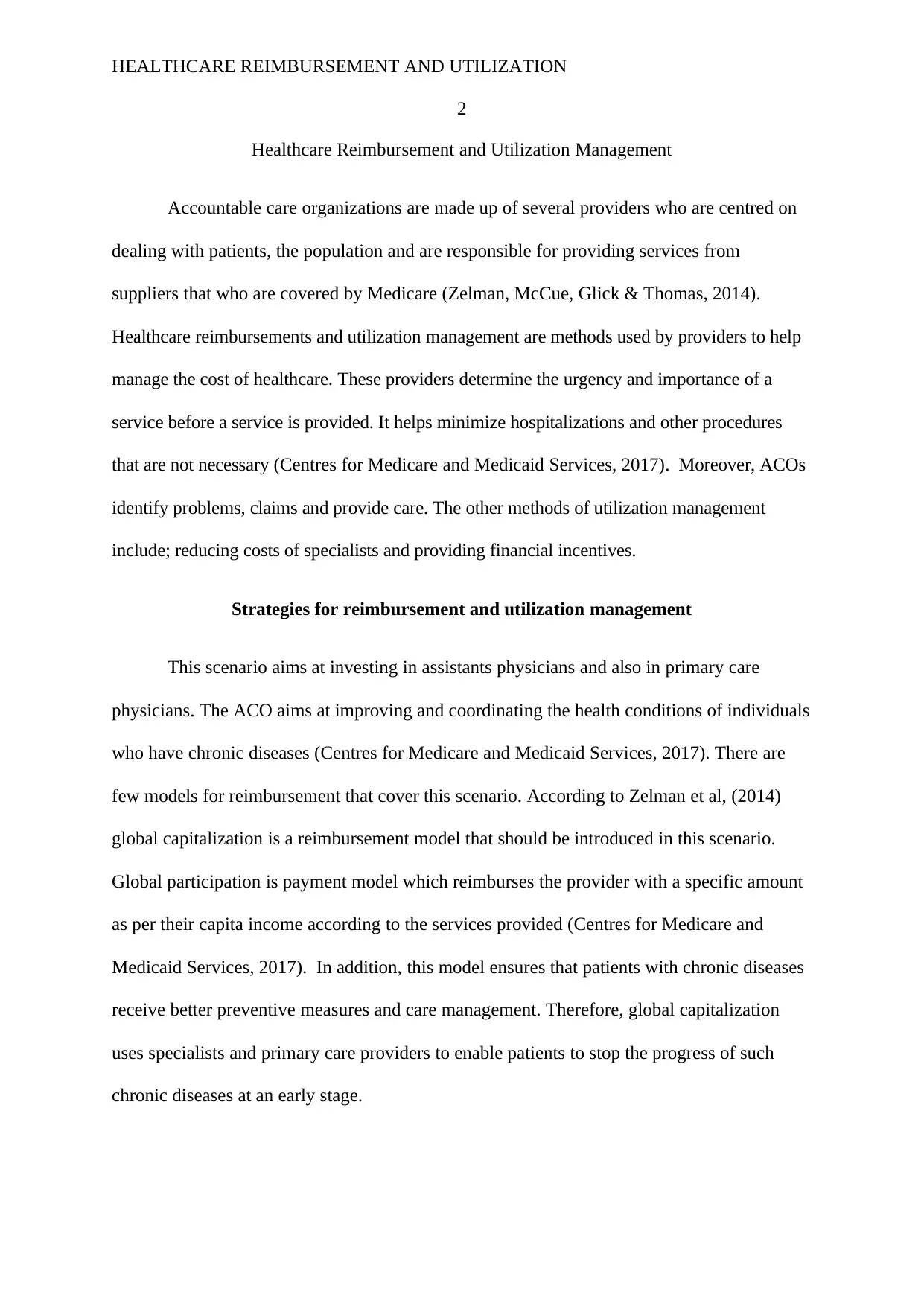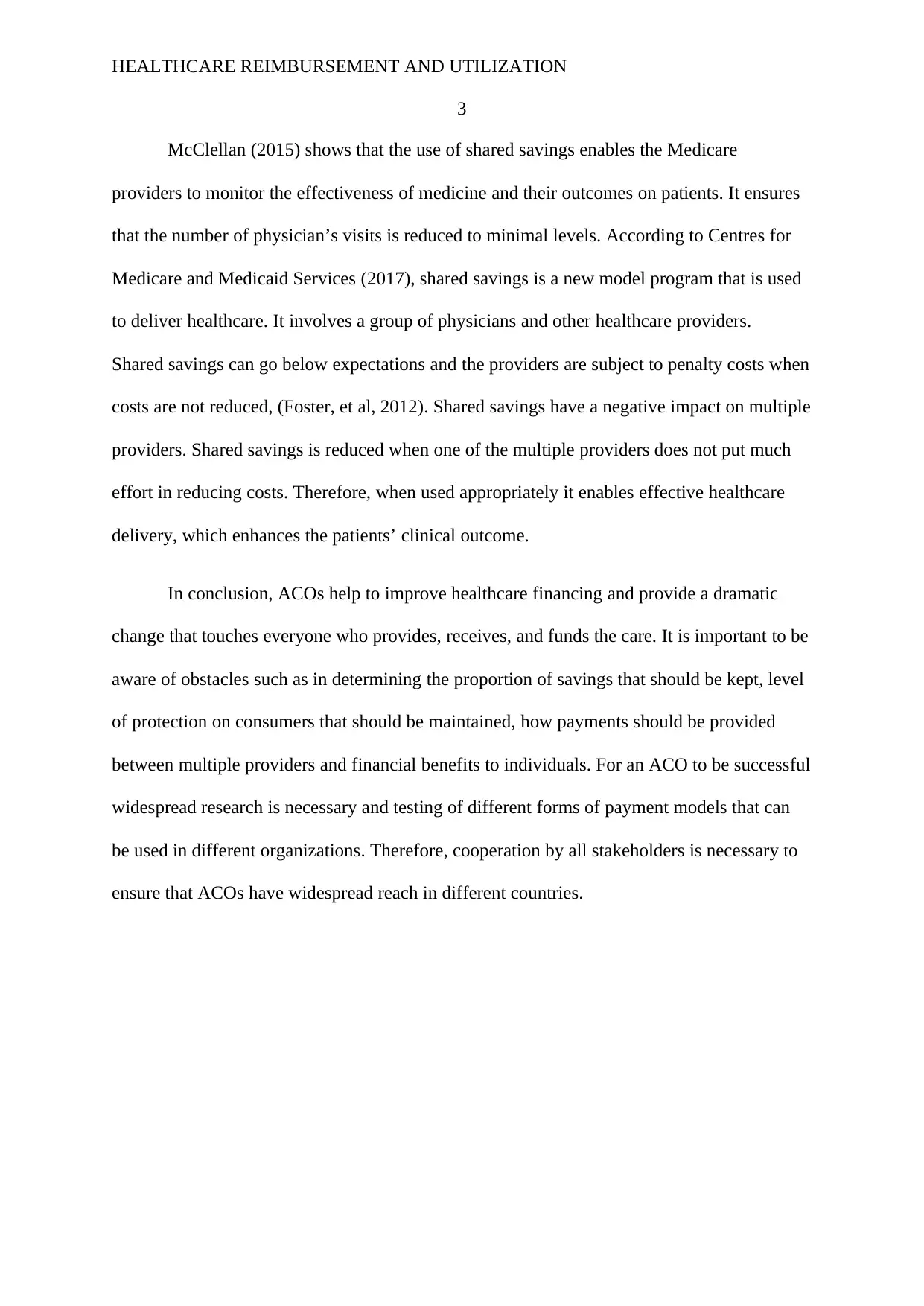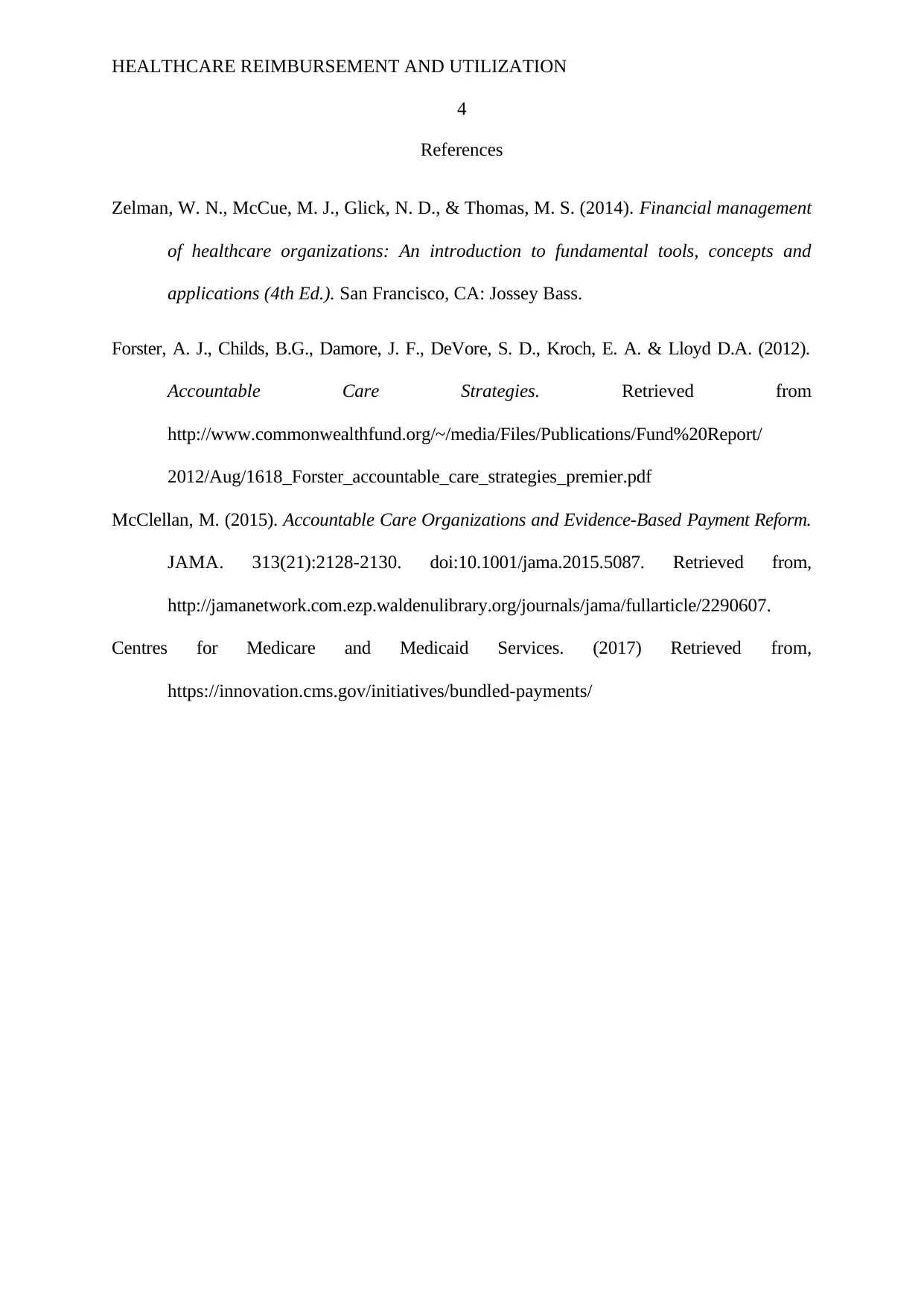Healthcare Reimbursement and Utilization Management in ACOs
VerifiedAdded on 2023/06/11
|4
|750
|258
Report
AI Summary
This report discusses healthcare reimbursement and utilization management strategies within the context of Accountable Care Organizations (ACOs). It highlights the importance of managing healthcare costs through methods like global capitalization and shared savings. The report emphasizes the role of primary care physicians and specialists in managing chronic diseases and reducing unnecessary hospitalizations. It also addresses potential challenges and obstacles in implementing ACOs, such as determining savings distribution and ensuring consumer protection. The conclusion stresses the need for widespread research and cooperation among stakeholders for successful ACO implementation. Desklib offers this report and other study resources for students.

Running head: HEALTHCARE REIMBURSEMENT AND UTILIZATION 1
Healthcare Reimbursement and Utilization Management
Student’s Name
Institutional Affiliation
Date of Submission
Healthcare Reimbursement and Utilization Management
Student’s Name
Institutional Affiliation
Date of Submission
Paraphrase This Document
Need a fresh take? Get an instant paraphrase of this document with our AI Paraphraser

HEALTHCARE REIMBURSEMENT AND UTILIZATION
2
Healthcare Reimbursement and Utilization Management
Accountable care organizations are made up of several providers who are centred on
dealing with patients, the population and are responsible for providing services from
suppliers that who are covered by Medicare (Zelman, McCue, Glick & Thomas, 2014).
Healthcare reimbursements and utilization management are methods used by providers to help
manage the cost of healthcare. These providers determine the urgency and importance of a
service before a service is provided. It helps minimize hospitalizations and other procedures
that are not necessary (Centres for Medicare and Medicaid Services, 2017). Moreover, ACOs
identify problems, claims and provide care. The other methods of utilization management
include; reducing costs of specialists and providing financial incentives.
Strategies for reimbursement and utilization management
This scenario aims at investing in assistants physicians and also in primary care
physicians. The ACO aims at improving and coordinating the health conditions of individuals
who have chronic diseases (Centres for Medicare and Medicaid Services, 2017). There are
few models for reimbursement that cover this scenario. According to Zelman et al, (2014)
global capitalization is a reimbursement model that should be introduced in this scenario.
Global participation is payment model which reimburses the provider with a specific amount
as per their capita income according to the services provided (Centres for Medicare and
Medicaid Services, 2017). In addition, this model ensures that patients with chronic diseases
receive better preventive measures and care management. Therefore, global capitalization
uses specialists and primary care providers to enable patients to stop the progress of such
chronic diseases at an early stage.
2
Healthcare Reimbursement and Utilization Management
Accountable care organizations are made up of several providers who are centred on
dealing with patients, the population and are responsible for providing services from
suppliers that who are covered by Medicare (Zelman, McCue, Glick & Thomas, 2014).
Healthcare reimbursements and utilization management are methods used by providers to help
manage the cost of healthcare. These providers determine the urgency and importance of a
service before a service is provided. It helps minimize hospitalizations and other procedures
that are not necessary (Centres for Medicare and Medicaid Services, 2017). Moreover, ACOs
identify problems, claims and provide care. The other methods of utilization management
include; reducing costs of specialists and providing financial incentives.
Strategies for reimbursement and utilization management
This scenario aims at investing in assistants physicians and also in primary care
physicians. The ACO aims at improving and coordinating the health conditions of individuals
who have chronic diseases (Centres for Medicare and Medicaid Services, 2017). There are
few models for reimbursement that cover this scenario. According to Zelman et al, (2014)
global capitalization is a reimbursement model that should be introduced in this scenario.
Global participation is payment model which reimburses the provider with a specific amount
as per their capita income according to the services provided (Centres for Medicare and
Medicaid Services, 2017). In addition, this model ensures that patients with chronic diseases
receive better preventive measures and care management. Therefore, global capitalization
uses specialists and primary care providers to enable patients to stop the progress of such
chronic diseases at an early stage.

HEALTHCARE REIMBURSEMENT AND UTILIZATION
3
McClellan (2015) shows that the use of shared savings enables the Medicare
providers to monitor the effectiveness of medicine and their outcomes on patients. It ensures
that the number of physician’s visits is reduced to minimal levels. According to Centres for
Medicare and Medicaid Services (2017), shared savings is a new model program that is used
to deliver healthcare. It involves a group of physicians and other healthcare providers.
Shared savings can go below expectations and the providers are subject to penalty costs when
costs are not reduced, (Foster, et al, 2012). Shared savings have a negative impact on multiple
providers. Shared savings is reduced when one of the multiple providers does not put much
effort in reducing costs. Therefore, when used appropriately it enables effective healthcare
delivery, which enhances the patients’ clinical outcome.
In conclusion, ACOs help to improve healthcare financing and provide a dramatic
change that touches everyone who provides, receives, and funds the care. It is important to be
aware of obstacles such as in determining the proportion of savings that should be kept, level
of protection on consumers that should be maintained, how payments should be provided
between multiple providers and financial benefits to individuals. For an ACO to be successful
widespread research is necessary and testing of different forms of payment models that can
be used in different organizations. Therefore, cooperation by all stakeholders is necessary to
ensure that ACOs have widespread reach in different countries.
3
McClellan (2015) shows that the use of shared savings enables the Medicare
providers to monitor the effectiveness of medicine and their outcomes on patients. It ensures
that the number of physician’s visits is reduced to minimal levels. According to Centres for
Medicare and Medicaid Services (2017), shared savings is a new model program that is used
to deliver healthcare. It involves a group of physicians and other healthcare providers.
Shared savings can go below expectations and the providers are subject to penalty costs when
costs are not reduced, (Foster, et al, 2012). Shared savings have a negative impact on multiple
providers. Shared savings is reduced when one of the multiple providers does not put much
effort in reducing costs. Therefore, when used appropriately it enables effective healthcare
delivery, which enhances the patients’ clinical outcome.
In conclusion, ACOs help to improve healthcare financing and provide a dramatic
change that touches everyone who provides, receives, and funds the care. It is important to be
aware of obstacles such as in determining the proportion of savings that should be kept, level
of protection on consumers that should be maintained, how payments should be provided
between multiple providers and financial benefits to individuals. For an ACO to be successful
widespread research is necessary and testing of different forms of payment models that can
be used in different organizations. Therefore, cooperation by all stakeholders is necessary to
ensure that ACOs have widespread reach in different countries.
⊘ This is a preview!⊘
Do you want full access?
Subscribe today to unlock all pages.

Trusted by 1+ million students worldwide

HEALTHCARE REIMBURSEMENT AND UTILIZATION
4
References
Zelman, W. N., McCue, M. J., Glick, N. D., & Thomas, M. S. (2014). Financial management
of healthcare organizations: An introduction to fundamental tools, concepts and
applications (4th Ed.). San Francisco, CA: Jossey Bass.
Forster, A. J., Childs, B.G., Damore, J. F., DeVore, S. D., Kroch, E. A. & Lloyd D.A. (2012).
Accountable Care Strategies. Retrieved from
http://www.commonwealthfund.org/~/media/Files/Publications/Fund%20Report/
2012/Aug/1618_Forster_accountable_care_strategies_premier.pdf
McClellan, M. (2015). Accountable Care Organizations and Evidence-Based Payment Reform.
JAMA. 313(21):2128-2130. doi:10.1001/jama.2015.5087. Retrieved from,
http://jamanetwork.com.ezp.waldenulibrary.org/journals/jama/fullarticle/2290607.
Centres for Medicare and Medicaid Services. (2017) Retrieved from,
https://innovation.cms.gov/initiatives/bundled-payments/
4
References
Zelman, W. N., McCue, M. J., Glick, N. D., & Thomas, M. S. (2014). Financial management
of healthcare organizations: An introduction to fundamental tools, concepts and
applications (4th Ed.). San Francisco, CA: Jossey Bass.
Forster, A. J., Childs, B.G., Damore, J. F., DeVore, S. D., Kroch, E. A. & Lloyd D.A. (2012).
Accountable Care Strategies. Retrieved from
http://www.commonwealthfund.org/~/media/Files/Publications/Fund%20Report/
2012/Aug/1618_Forster_accountable_care_strategies_premier.pdf
McClellan, M. (2015). Accountable Care Organizations and Evidence-Based Payment Reform.
JAMA. 313(21):2128-2130. doi:10.1001/jama.2015.5087. Retrieved from,
http://jamanetwork.com.ezp.waldenulibrary.org/journals/jama/fullarticle/2290607.
Centres for Medicare and Medicaid Services. (2017) Retrieved from,
https://innovation.cms.gov/initiatives/bundled-payments/
1 out of 4
Related Documents
Your All-in-One AI-Powered Toolkit for Academic Success.
+13062052269
info@desklib.com
Available 24*7 on WhatsApp / Email
![[object Object]](/_next/static/media/star-bottom.7253800d.svg)
Unlock your academic potential
Copyright © 2020–2026 A2Z Services. All Rights Reserved. Developed and managed by ZUCOL.




